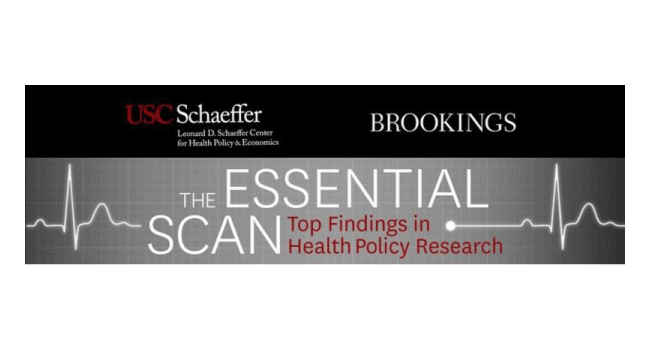What’s the latest in health policy research? The Essential Scan aims to help keep you informed on the latest research and what it means for policymakers. It is produced by the USC-Brookings Schaeffer Initiative for Health Policy, a collaboration between the Brookings Institution and the USC Schaeffer Center for Health Policy & Economics. To sign up to receive the Essential Scan straight to your inbox, sign up here.
Market Exclusivity for Drugs with Multiple Orphan Approvals (1983-2017) and Associated Budget Impact in the U.S.
Study by: William V. Padula, Sonal Parasrampuria, Mariana P. Socal, Rena M. Conti, and Gerard F. Anderson
The Orphan Drug Act extends market exclusivity for branded drugs by seven years if approved to treat a rare disease. This has stimulated research and development into rare diseases, but it also allows manufacturers to forestall generic competition. Furthermore, drug companies can apply for more than one orphan designation and further extend the exclusivity period. A new paper analyzes U.S. orphan drug approvals filed between 1983 and 2017. The researchers find a total of 432 branded drugs were approved for 615 orphan indicators. On average, there were 1.47 approvals per drug. The researchers found market exclusivity increased an additional 4.7 years, on average, when two orphan approvals were granted. Three, four, and five approvals added additional 3.1, 2.7, and 2.9- year extensions. The researchers found 25% of the orphan drugs had two or more approvals while 16 drugs had approvals that extended their market exclusivity at least one decade beyond the original 7-year exclusivity period. The researchers argue that policymakers should consider limiting the total number of rare disease approvals or exclusivity period that a single drug could generate. Full study here.
Effects of Medicaid Health Plan Dominance in Health Insurance Marketplaces
Study by: Erik Wengle, Emily Curran, Brigette Courtot, Caroline Elmendorf, and Kevin Lucia
Medicaid insurers are increasingly dominant in many of the Affordable Care Act health insurance marketplaces across the country, often entering markets previously dominated by a single insurer and offering the lowest-premium plans. A new brief examines the effects of Medicaid insurer participation on health insurance marketplaces through telephone interviews with key stakeholders in six state marketplaces: Arkansas, California, Florida, New York, Ohio, and Washington. Medicaid insurers participate in 80 of 127 regions across the six states analyzed. In 54 of the 80 regions a Medicaid insurer offers the lowest-cost silver plan. The researchers find that Medicaid insurer business models have largely contributed to their competitiveness in the market. In particular, success is attributed to the insurers’ ability to leverage provider networks, keep low administrative costs, use strict utilization review practices, and increase broker commissions. The authors also find that Medicaid insurers have adapted to the commercial marketplace, with increasingly broad provider networks, higher reimbursement rates, and similar benefit designs and advertising practices to commercial insurers. The authors conclude that overall it seems Medicaid insurers participation has increased choice and affordability in the individual insurance market. Full study here.
Home Health Use in Medicare Advantage Compared to Use in Traditional Medicare
Study by: Laura Skopec, Stephen Zuckerman, Joshua Aarons, et al
Medicare helps assist home bound patients who need intermittent skilled care by offering at-home treatment. While this benefit may prevent costlier care by helping keep beneficiaries in their home, ensuring appropriate use of home healthcare has posed challenges because the benefit has proven to be very susceptible to fraud and abuse by home health agencies. Under traditional Medicare, home health agencies are paid for a sixty-day episode of care rather than being paid per-service. This might incentivize them to strategically provide services to healthier patients to maximize their reimbursement. A new study compared Medicare Advantage (MA) to traditional Medicare and found that in 2016 MA enrollees were less likely to use home healthcare than traditional Medicare enrollees, had 7.1 fewer days per home health spell, and were less likely to be admitted to the hospital during this time. Furthermore, MA plans that imposed beneficiary cost sharing or prior authorization had lower rates of home health use, a finding that was validated in interviews. The researchers conclude that several new home health payment policies, including value-based models that tie payment to performance and aligning payment to patient clinical characteristics, may lead to a reduction in these differences. Full study here.
Community Use of Face Masks and COVID-19: Evidence from a Natural Experiment of State Mandates in the U.S.
Study by: Wei Lyu and George L. Wehby
State and local policies mandating the use of face coverings to help slow the spread of the COVID-19 are intensely disputed across the United States and the world. At the start of the pandemic, the Centers for Disease Control and Prevention and the World Health Organization only recommended symptomatic individuals wear face masks to help stop the spread of COVID-19. This changed as more information about spread and transmission emerged, leading some states to expand mandates to all individuals in public, whether or not they were experiencing symptoms. A new study leverages mandates of face mask use in public to examine trends in new COVID-19 cases in 15 states plus D.C. The researchers estimate a decline of 0.9 percentage points in the daily COVID-19 growth rate in the 1-5 days after signing the mandate. This increases to a decline of 2 percentage points in the daily growth rate by 21+ days after signing. Overall, estimates from this study suggest as many as 230,000-450,000 COVID-19 cases were averted by these mandates as of May 22, 2020. Full study here.
Click here to receive The Essential Scan email.
The Essential Scan is produced by the USC-Brookings Schaeffer Initiative for Health Policy, a collaboration between the Brookings Institution and the USC Schaeffer Center for Health Policy & Economics.

